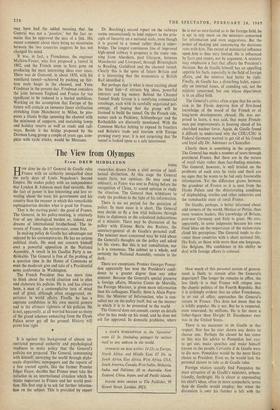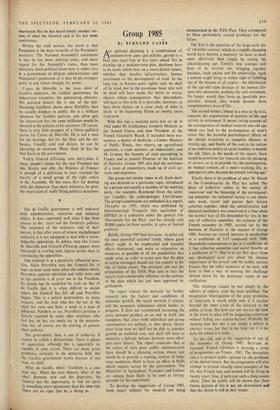The View from Olympus
From DREW MIDDLETON
PARIS
How does he do it? General de Gaulle rules France with an authority unequalled since the early days of Louis Napoleon's Second Empire. He makes policy with an independence that Lyndon B. Johnson must find enviable. But the fact of power is less interesting and less re- vealing about the man, his government and his country than the manner in which this remarkable septuagenarian decides what is good for France.
That is the starting point: the good of France. The General, in his policy-making, is relatively free of any ideological burden or, indeed, any dreams of international brotherhood. The in- terests of France, the nation-state, come first.
In making policy de Gaulle has advantages not enjoyed by his contemporaries. He has no serious political rivals. He need not concern himself over a powerful opposition in the National Assembly. A revolt in his Gaullist Party is un- thinkable. The General is free of the probing of a question time in the House of Commons or even the moderate give and take of a Presidential news conference in Washington.
The French President thus has more time to think about the world situation and to plan and elaborate his policies. He is, and has always been, a man of a contemplative turn of mind and of great, although often exaggerated, ex- perience in world affairs. Finally, he has a supreme confidence in his own mental powers and in the ultimate rightneSs of his policies. He is not, apparently, at all worried because so many of the grand schemes en1anating from the Elysde Palace never get off the ground. History will prove him right.
It is against this background of almost un- restricted personal authority and psychological readiness to make policy that the General's policies are prepared. The General, communing with himself, surveying the world through diplo- matic dispatches, newspapers and the reports of a few trusted agents, like the former Premier Edgar Faure, decides that France must take the initiative in an international situation which he thinks important to France and her world posi- tion. His first step is to ask for further informa- tion on the subject. This is provided by expert researches drawn from a civil service of intel- lectual distinction. At this stage the General wants facts, not opinions. He may send an emissary, as FaUre was sent to Peking before the recognition of China, to sound opinion or study the situation. The General then withdraws to study the problem in the light of his information.
There is no set period for the gestation of policy. In most cases it is short. The General may decide to fly a few trial balloons through hints to diplomats or the calculated indiscretions of a minister. There may be discussion of the policy with Etienne Burin des Roziers, the secretary-general of de Gaulle's personal staff. The minister most concerned may be told about the General's thoughts on the policy and asked for his views. But this is not consultation, nor is it a consensus. The cabinet as a whole, and certainly the National Assembly, remain in the dark.
There are exceptions. Premier Georges Pompi- dou apparently has won the President's confi- dence to a greater degree than any other minister. Because the General's special preserve is foreign affairs, Maurice Couve de Murville, the Foreign Minister, is given more information than his colleagues. Finally, there is Alain Peyre- fitte, the Minister of Information, who is con- sulted not on the policy itself, but on the manner in which it is to be presented to the world The General does not consult, except on details after he has made up his mind, and he does not ask for approval. In domestic problems, where he is not as sure-footed as in the foreign field, he is apt to rely more on the ministers concerned for information and even suggestions. But the power of making and announcing the decisions rests with him. The extent of ministerial influence upon him is thus very limited. He is influenced by facts and events, not by argument. A minister may emphasise a fact that affects the President's decision. But de Gaulle himself has an appalling appetite for facts, especially in the field of foreign affairs, and the minister had better be right. Finally, de Gaulle has a disturbing habit, especi- ally on internal issues, of sounding out, not the minister concerned, but one whose department is in an allied field.
The General's critics often argue that his seclu- sion in the Elysde deprives him of first-hand knowledge of the mood of the French or of long-term developments abroad. He was sur- prised to learn, it was said, that many French- men put improvements in housing ahead of his cherished nuclear force. Again, de Gaulle found it difficult to understand why the CDU /CSU in Federal Germany wanted to get rid of his friend and loyal ally Dr. Adenauer as Chancellor.
Clearly there is something in the argument. The General has made a number of tours through provincial France. But these are in the nature of royal visits rather than fact-finding missions. The General, however, is well briefed on the problems of each area he visits and theft are no signs that he wants to be fed only favourable information. Yet the difference grows between the grandeur of France as it is. seen from the Elysee Palace and the deteriorating condition of shipbuilding, textiles and other industries and the ramshackle state of rural France.
De Gaulle, perhaps, is better informed about odd corners of the world, Mexico or Persia, than most western leaders. His knowledge of Britain, post-war Germany and Italy is great. He errs, apparently, in some judgments because his own fixed ideas on the importance of the nation-state cloud his perception. The General tends to dis- count those countries with a short national life, like Italy, or those with more than one language, like Belgium. His confidence in his ability to deal with foreign affairs is colossal.
How much of this personal system of govern- ment. is likely to remain after the General's departure? The longer he remains in office, the less likely it is that France will relapse into the chaotic politics of the Fourth Republic. But it is strikingly evident that no other Frenchman, in or out of office, approaches the General's stature in France. This does not mean that he is wildly popular. He is not. But he is respected, even venerated, by millions. He is far more a father-figure than Dwight D. Eisenhower ever was in the United States.
There is no successor to de Gaulle in this respect. Nor has he ever shown any desire to choose one. Perhaps the closest he has come to this was his advice to Pompidou last year to get out, make speeches and make himself known to the people. Certainly if de Gaulle were to die now, Pompidou would be the most likely choice as President. Even so, he would lack the personal stature to rule as de Gaulle rules.
Foreign visitors usually find Pompidou the most attractive of de Gaulle's ministers, urbane, friendly, forthright. He is clever at expounding his chief's ideas, often in more sympathetic terms than de Gaulle would employ, but when the discussion is over his listener is left with the impression that he has heard simply another ver- sion of what the General said at his last news conference.
Within the civil service, the word is that Pompidou is the most versatile of the President's ministers. The National Assembly's assessment is that he bas more political sense, and more regard for the Assembly's views, than most ministers. Such political know-how is rather rare In a government of diligent administrators and Pompidou's possession of it may be his strongest point in any future struggle for power.
Couve de Murville is the beau ideal of Gaullist ministers, the faithful spokesman, the industrious executive, the penetrating observer. His political history (he is one of the late- blooming Gaullists) shows more flexibility than he usually displays in public. He is a brilliant advocate for Gaullist policies; one often gets the impression that the same brilliance would be devoted to the policies of his successor. Of course, there is very little prospect of a future political career for Couve de Murville. He is not a man for the hustings, but for the Quai and the em- bassies. Usually cold and distant, he can be charming on occasion. Many think he has the best brain in the government.
Valery Giscard d'Estaing. now thirty-nine, is many people's choice for the next President but one. Brainy and able, the Minister of Finance is enough of a politician to have retained the loyalty of a small group of the right centre in the Assembly. He has more flair for dealing with the electorate than most ministers; he gives the impression of really liking political occasions.
The de Gaulle government is well endowed with administrative, executive and technical ability. It does supremely well what it has been chosen to do: carry out the General's policies. The weakness of the ministers, and of their patron, is that after years of almost unchallenged authority it is not equipped to deal with a know- ledgeable opposition. In debate, men like Couve de Murville and Giscard d'Estaing appear more interested in scoring neat, logical points than in convincing the opposition.
One minister is in a peculiarly influential posi- tion. Alain Peyrefitte sees the General for at least an hour each week when the cabinet meets. Peyrefitte controls television and radio news and in this position is of great use to the President. So closely has he modelled his style on that of de Gaulle that it is often difficult to decide where the General has left off and Peyrefitte begun. This is a palace government, in many respects, and the man who has the 'ear of the chief for even one hour a week is a man of Influence. Needless to say, Peyrefitte's position is bitterly resented by some other ministers, who feel that he has too much say in the presenta- tion, but, of course, not the making, of govern- ment policies.
The government, then, is one of authority. It cannot be called a dictatorship. There is plenty of opposition, although this is apparently in- capable of joint action. There are many grave problems, certainly in the domestic field. But the Gaullist government works because of one man, its chief.
After de Gaulle, what? Gaullism is a . one- man idea: When the man departs, what of the idea? Between now and the departure, the General has the opportunity to link his party to something more permanent than his own rule. There are no signs that he is doing so.



































 Previous page
Previous page